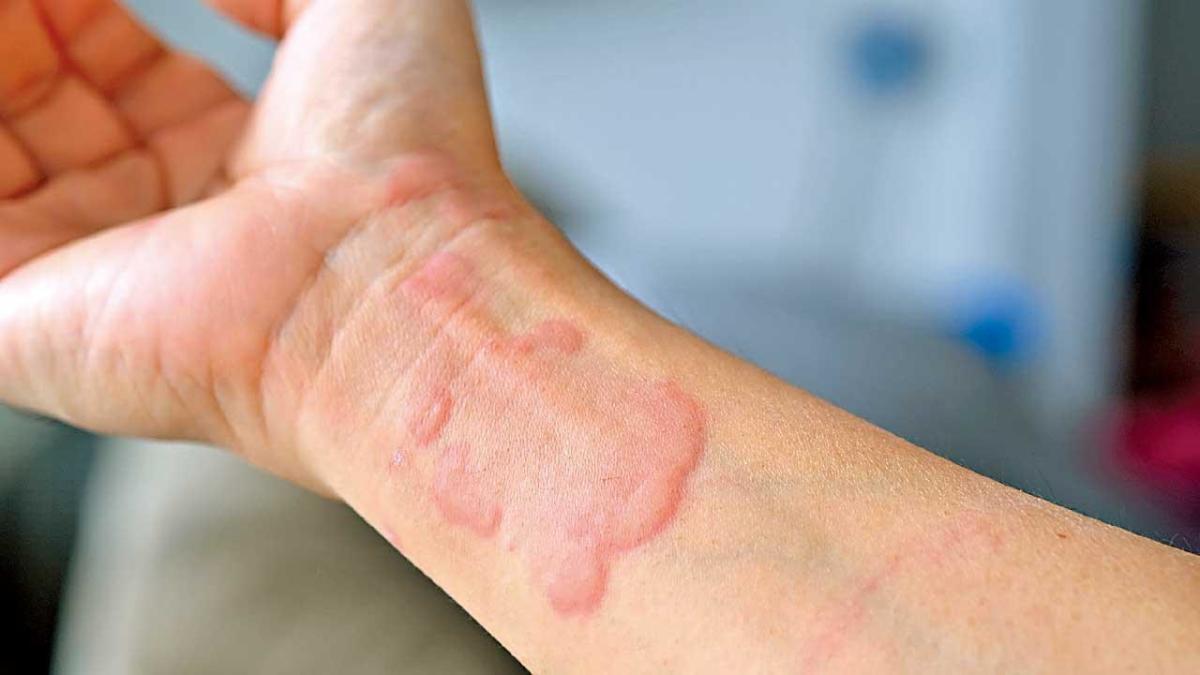Urticaria
Urticaria, commonly known as “rheumatism” or “rubella”, is very common, and some studies indicate that the lifetime incidence rate is as high as 20%. Urticaria mostly comes and goes like a breeze, and it is not necessary to seek medical attention. However, if the situation is severe, such as recurring attacks that affect appearance and quality of life, diagnosis and treatment are necessary to avoid causing mood disorders, sleep apnea, or other metabolic diseases. .
Dermatologist Dr. Chen Houyi said that urticaria can appear as “swollen rashes” like mosquito bites anywhere on the body, with different shapes and sizes, and is migratory and extremely itchy. It can disappear in a short time without leaving scars. But it can reappear suddenly. “If it appears in the deep tissue of the skin or mucous membranes, it will form ‘angioedema’. If it occurs in the tongue and throat, it may cause difficulty in breathing.”
Urticaria Chen Houyi
Tight clothing can induce
There are many triggering factors for urticaria, such as tight clothing, emotional stress, cold or hot weather, certain foods or drugs, and alcohol consumption. If it is chronic spontaneous urticaria without specific triggers, it may be related to Related to autoimmune mechanisms. Chen Houyi explained, “There are some autoimmune antibodies in the patient’s blood that bind to the immunoglobulin E receptors of mast cells, causing the mast cells to release histamine and inflammatory factors. As a result, the skin tissue swells, the blood vessels dilate, and redness, swelling, and itching appear. shape.”
Or cause other immune diseases
Although urticaria does not directly affect physical health, it still greatly affects patients’ lives. For example, a past survey showed that the itching of urticaria is twice as severe as that of mosquito bites. 83% of people feel itchy at night, and 62% of people have difficulty falling asleep as a result. Chen Houyi continued, “Severe insomnia can cause anxiety and depression, which will interact with sleep quality. Poor sleep quality will also increase the risk of urticaria by up to 2 times, making the condition more recurring and difficult to heal.” On the other hand, 45% of patients with uncontrolled urticaria are at moderate to high risk of developing sleep apnea; patients with urticaria may also suffer from other autoimmune diseases, allergic diseases, and the risk of cancer is also increased.
Urticaria
Prevent activated mast cells
Antihistamine drugs are generally used to treat urticaria. Patients need to continue taking the medication or increase the dose several times a day. However, studies have found that even if the dose is increased to four times, less than half of the patients can effectively control the disease. The new treatment uses the biological agent omalizumab, which can prevent autoimmune antibodies from binding to mast cells, avoiding subsequent chain reactions and alleviating symptoms. Research shows that the severity of rashes and itching can be reduced by more than 70%, and it is effective for 80% of patients. 40% of patients can even recover without the need for medication.
Condition improved by 80%
Ms. Huang has suffered from urticaria for more than 30 years. At first, the condition was not serious and she thought it was just a mosquito bite or food allergy. Later, when she was about to give birth to her second child, her condition suddenly became serious. She was controlled with steroid injections right after the birth. It took more than a month of medication to get relief. After that, urticaria appeared repeatedly, lasting for a month at a time. During this period, the urticaria would travel around the body and appear in turns, which was extremely annoying. Ms. Huang said that urticaria caused insomnia and she also felt stressed about the condition. She sometimes scratched her skin unconsciously and had to wear long-sleeved shirts to cover it up in summer, which greatly affected her work and life. She admitted that oral medication had little effect and she could only wait for natural improvement. Currently undergoing the second course of treatment with biological agents (6 injections per course), the number of attacks has been significantly reduced, and the rheumatoid arthritis during attacks is also milder than before, with an improvement of about 80%.
The original article was published on AM730
#Urticaria #trivial #matter #insomnia #depression
2023-10-30 20:30:23
